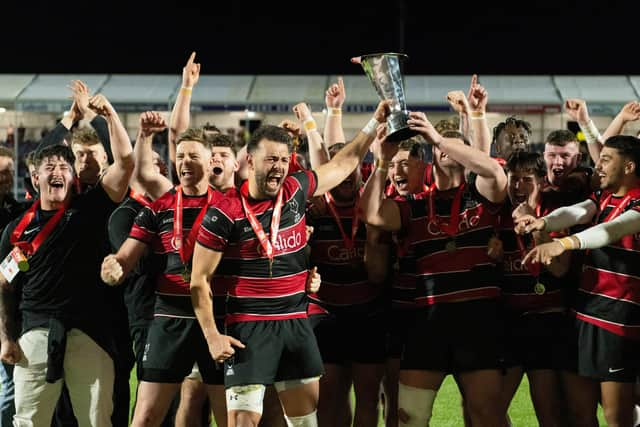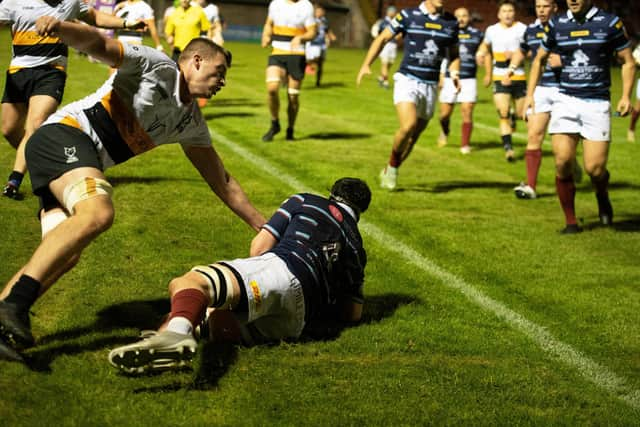Fraser Brown: Super Series offers a pathway for players and coaches and I’ll be sorry to see it go
The final FOSROC Super Series Sprint begins on Friday and I’ll have the privilege of being the head coach of Watsonians throughout the tournament, which will run over seven weekends.
I took the job not knowing it is now likely to finish in June and was really looking forward to being in charge for not just the Sprint but for the Super Series Championship, which was scheduled for next season. The decision to scrap the Super Series means the Championship will likely not now happen as Scottish Rugby goes down a different route with its pathway plans.
Advertisement
Hide AdAdvertisement
Hide AdThe Sprint is shoehorned in at the end of the season but I like the short, sharp nature of it. A lot can be learned from a quick tournament and then applied in an extended format. The opportunity to review, change, adapt and then go again so quickly isn’t something that happens in sport very often and it’s a great opportunity as a coach to test your abilities in a short space of time. It will be frustrating if the competition does end in June and we don’t get that challenge as a coaching group but I’m still looking forward to my first head coaching opportunity.


I’m the only full-time coach on the Watsonians Super Series team but we’ve also got Richard Sneddon, who’s been there from the start and whose full-time job is as a teacher at Watson’s; Nikki Walker, whose full-time job is Curriculum Learning Manager for Sport and Outdoor Activities at Borders College and Edinburgh co-captain Grant Gilchrist, who is our lineout specialist.
I have another job as well, of course, because I’m still a full-time player at Glasgow Warriors in the middle of doing rehab from a serious injury, so it has been full-on.
We’ve had to be organised and I’ve tried to strip things back and make it simple and enjoyable for the players, focusing on conditioning and skill work. I think part of the point of Super Six was to put out a product that was enjoyable to watch as well as giving people game-time and bridging the gap between the club and professional game.
I was assistant coach last year and I think in some of our games our skill-set and our conditioning weren’t at the level required. Although our intent was there, at times in last year’s championship, we didn’t have the ability to go out and play the type of high tempo, highly skilled, sometimes direct rugby we had hoped to.


I’ve really enjoyed the training sessions, enjoyed planning them and leading on that side of things. The other coaches feed into it but ultimately, as head coach, it’s on you to come up with the ideas and to drive the sessions.
Of course, there are frustrations, chiefly around player availability. My mindset is that I don’t want to add players to the squad who are non-Scottish qualified or journeymen in their late 20s who are here to pick up a bit of extra cash. I think this competition is an opportunity for younger players both in academy set-ups, and those out with who have either developed late and missed age grade rugby, have missed out due to injury or who have simply performed well in the club game, to be exposed to top quality coaching and a higher level of rugby. It’s there to provide an important platform for young players to be able to progress into the professional game.
It's important for me to help young talent to develop through meaningful game-time but also to find and reward players from the ‘community game’.
Advertisement
Hide AdAdvertisement
Hide AdThe only problem has been that the club game has overlapped. There’s a Scottish Cup semi-final this weekend, for example, and one of our players isn’t available because of that, and there’s been the inter-district championship, too.
Watsonians have a squad of 29, plus five academy players, plus some from the club and some from the schools at Watson’s and Merchiston who want to come in and train and are good prospects. So realistically we should have had 35-36 at training sessions but because of other commitments we were down to 18 at the start.
But that’s the sort of challenge all coaches have to deal with and I’m enjoying it.
I’ve increased the sessions so we train three nights a week, Monday, Tuesday and Thursday. I wanted to make a point of differentiating between the club game and semi-professional. It’s not about doing what you did before and getting extra money for it. It’s an extra commitment, a higher level of rugby, so the mindset has to change and that extra session on Monday is important. I also felt we weren’t fit enough last season, so the extra session helps in that regard and gives us more time to work on skills. The players have reacted well to it because everyone we have wants to play and train at a higher level. They can see their progression.
Our players were given conditioning programmes to work on through February and then we started as a squad in the first week of March. So we had a six-week pre-season which then feeds into an eight-week season.
It may be the last iteration of the Super Series but it is obviously still a meaningful tournament because the two pro teams have again entered their A sides, and Glasgow Warriors and Edinburgh wouldn’t have become involved if they didn’t feel it was something that would benefit their players
There will be a lot of young boys over the next few weekends who will be getting to play in a level of rugby they otherwise wouldn’t have been exposed to. For young kids it should be about quality games against quality opposition with good frameworks in place so they can progress and learn.
If you are a young front-rower or a young ten or a young second-row trying to call lineouts, the only way to learn is to do it in pressure situations. Positive reinforcement is important, of course it is, but some of the most important learning as players are born from negative situations in a game rather than positive interactions in training. They both have their place of course, but there is no learning like on the job learning.
Advertisement
Hide AdAdvertisement
Hide AdThe Super Series ran last year with the Edinburgh and Glasgow Warriors A teams and it was reasonably successful. It’s the same format this year, so the two A teams play three games each, against the teams on their side of the country although Glasgow A’s first game this weekend is against Boroughmuir Bears.
It was probably a good thing to introduce the A teams last year given that Scottish Rugby’s new pathways system is going to centre around those teams.
So who’s going to be in those A teams? Well, from Glasgow’s point of view it’s going to be mainly academy players. I don’t think there will be many senior pros involved unless they are in need of game time returning from injury.
I think the A teams are a really good addition but a lot of the players involved are contracted to other Super Six teams. In an ideal world, they would be the ones who Glasgow and Edinburgh would be looking to bring into their A teams next season.
But having the A teams playing against the Super Series teams is a good way of measuring their progress because they are playing against full-time professional players who are training every day whereas the Super Series players are part-time pros, training two or three times a week. So I like the concept, it’s just a little tricky sometimes in terms of player availability.
One of the big successes of Super Six and the Super Series has been its coaching pathway. Pete Horne is now a Scotland team coach having been at Ayr two years ago. He was a player as recently as two and a half years ago. Pete Murchie, an assistant coach at Glasgow Warriors, has one of the best, if not the best, defensive records in the URC this season, and he was Ayr head coach three and half years ago. Then you’ve Sean Kennedy and Scottie Lawson at Stirling, and it’s given Grant Gilchrist an opportunity to try coaching for the first time in this environment.
He runs the lineout for Edinburgh and Scotland but it’s a completely different beast when you go into a new environment with a different group of players and you are trying to get across to them what you see in the most succinct way. So it’s great that a really intelligent rugby man like Grant is getting that experience and I hope he and others will continue to have those opportunities after the Super Series finishes because I know I’m grateful for the chance it has given me.
Comments
Want to join the conversation? Please or to comment on this article.
